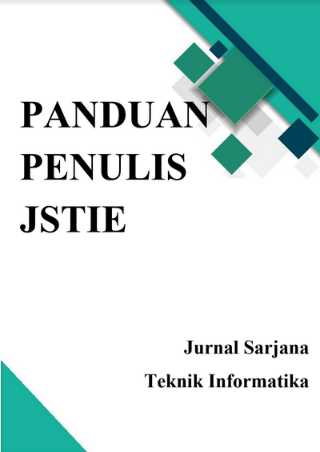PENDEKATAN METODE ATURAN PERUBAHAN KATA UNTUK MENGALIHKAN TEKS BAHASA INDONESIA KE BAHASA BELITUNG
DOI:
https://doi.org/10.12928/jstie.v5i2.10830Abstract
Bahasa merupakan sarana yang digunakan dalam komunikasi, baik komunikasi lisan maupun tertulis. Di setiap Negara menggunakan berbagai macam bahasa yang berbeda. Pulau Belitung salah satu daerah di Indonesia, mayoritas masyarakat Belitung menggunakan dialek bahasa Melayu Belitung. Banyaknya wisatawan maupun pendatang di pulau Belitung menjadi hambatan dalam proses komunikasi, salah satu alternatif solusi ialah membuat sistem penerjemah dari teks bahasa Indonesia ke bahasa Belitung. Sistem ini dirancang berbasis web dengan bahasa pemrograman PHP. Penerjemah teks bahasa Indonesia ke teks Bahasa Belitung menggunakan metode aturan perubahan kata, dimana sekumpulan aturan basis pengetahuan yang di kodekan kedalam aturan IF-THEN dan sebuah tempat penyimpanan (basis data).
Metodologi yand dilakukan dalam penelitian ini yaitu dengan dengan metode wawancara dan studi pustaka. Tahap perancnagan sistem terdiri dari perancangan proses, perancangan parser, perancangan kamus, perancangan sistem representasi pengetahuan, dan perancangan interface.
Dari aplikasi penerjemah teks bahasa Indonesia ke bahasa Belitung, mampu memberikan output terjemahan yang sesuai, mampu menterjemahkan kumpulan kata maupun kalimat, serta mampu menterjemahkan kata berimbuhan untuk sekali inputan, serta dapat menterjemahkan ke dalam dua arah bahasa.
Kata Kunci :Aturan perubahan kata, bahasa Belitung, Penerjemah,.References
DJ Ran. 2013. Letak Goegrafis Kabupaten Belitung, (https://id.wikipedia.org/w/index.php?title=Kabupaten_Belitung&oldid=9744766, diakses pada tanggal 17 Oktober 2015 jam 10.15).
Fauziyah, Asmaul dkk. 2011. Akurasi Hasil Terjemahan Bahasa Arab ke Dalam Bahasa Indonesia Dengan Aplikasi “ Google Translateâ€. Malang : Universitas Negeri Malang
Khotijah, dkk. 2014. Aplikasi Penerjemah dari Bahasa Indonesia ke Bahaasa Madura dengan Menggunakan Metode Rule Based. Bangkalan : Universitas Trunojoyo Madura.
Putu Deni Praatama, I dan Agus Muliantara. 2012. Perancangan dan implementasisistem penerjemah teks bahasa inggris kebahasa bali dengan menggunakan pendekatanberbasis aturan (rule based). Jurnal Ilmu Komputer. (Vol. 5 No. 1 April 2012).
Resnawan, Komang Trya Chandra dkk. 2015. Pengembangan aplikasi Kamus dan Penerjemah Bahasa Indonesia – Bahasa Bali Menggunakan Metode Rule Based Berbasis android. Jurnal KARMAPATI. (Volume.4 No.2 February 2015)
Downloads
Published
Issue
Section
License
License and Copyright Agreement
In submitting the manuscript to the journal, the authors certify that:
- They are authorized by their co-authors to enter into these arrangements.
- The work described has not been formally published before, except in the form of an abstract or as part of a published lecture, review, thesis, or overlay journal. Please also carefully read Journal Posting Your Article Policy.
- The work is not under consideration for publication elsewhere.
- The work has been approved by all the author(s) and by the responsible authorities – tacitly or explicitly – of the institutes where the work has been carried out.
- They secure the right to reproduce any material that has already been published or copyrighted elsewhere.
- They agree to the following license and copyright agreement.
Copyright
Authors who publish with Jurnal Sarjana Teknik Informatika agree to the following terms:
- Authors retain copyright and grant the journal right of first publication with the work simultaneously licensed under a Creative Commons Attribution License (CC BY-SA 4.0) that allows others to share the work with an acknowledgement of the work's authorship and initial publication in this journal.
- Authors are able to enter into separate, additional contractual arrangements for the non-exclusive distribution of the journal's published version of the work (e.g., post it to an institutional repository or publish it in a book), with an acknowledgement of its initial publication in this journal.
- Authors are permitted and encouraged to post their work online (e.g., in institutional repositories or on their website) prior to and during the submission process, as it can lead to productive exchanges, as well as earlier and greater citation of published work.







